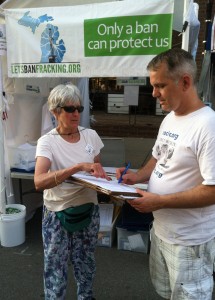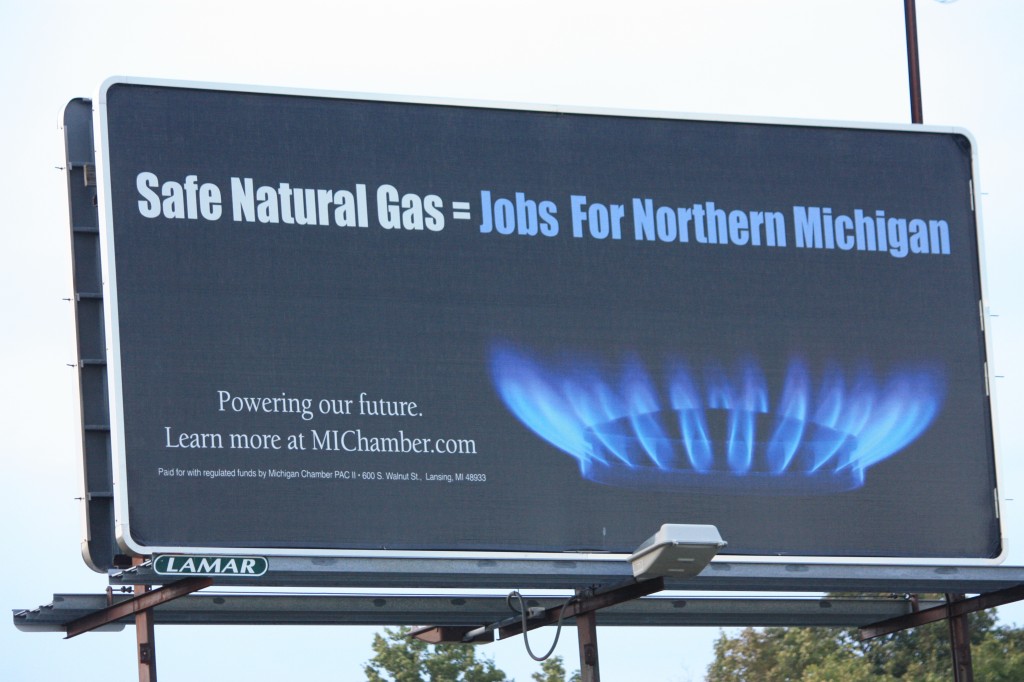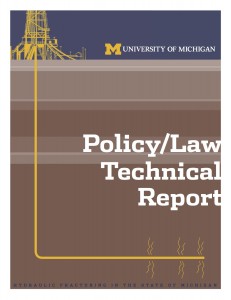
The University of Michigan’s fracking study’s steering committee members contributed to Michigan Chamber of Commerce’s political campaign against the Committee to Ban Fracking in Michigan‘s ballot initiative… and an analysis of the Committee’s campaign–or anything about Michigan’s ballot initiative process–is nowhere to be found.
With great fanfare, the University of Michigan’s Graham Sustainability Institute finally released technical reports as part of its integrated assessment of hydraulic fracturing in Michigan on Sep 3. Along with an overview, the seven reports cover fracking technology, geology/hydrology, environment/ecology, human health, policy/law, economics, and public perception.
The reports — three months late according to the schedule — give no attention to the ongoing campaign of the Committee to Ban Fracking in Michigan for a veto-proof ballot initiative to ban high-volume horizontal fracking. Instead the overview just assumes “future hydraulic fracturing treatments will likely be of very high volume,” so Michigan better get ready.
Mentioned prominently, both in the overview and the report on policy and law, are several regulatory reform bills now in the legislature. They concern water withdrawal, chemical disclosure, and landowner protection. Similar bills were introduced in the previous term. No hearings were held and they died.
Groups Seeking a Ban on Fracking
One reference to the Committee to Ban Fracking in Michigan did slip into the Public Perceptions report. The mention was sloppy. Instead of this year’s effort for a legislative ballot initiative, it referenced last year’s very different campaign for a constitutional amendment. And there is no link for interested readers to learn more at the initiative’s website. See http://letsbanfracking.org . (The report cites our banmichiganfracking.org website as the source on December 2013–which hasn’t happened yet).

The Committee to Ban Fracking in Michigan, one of two prominent groups seeking a ban on fracking, is conducting a highly-visible statewide ballot initiative in 2013 that the U of M didn't notice much. Washtenaw county coordinator Nancy Witter collects signatures at a booth at the Ann Arbor Art Fairs in U of M's backyard, July 2013. Photo by LuAnne Kozma. Below: Video of Committee to Ban Fracking's action on September 13.
In a section describing the differences between the pro-regulation/pro-frack groups such as Michigan Environmental Council and Tip of the Mitt Watershed Council, both of which sit on the study’s steering committee, and those groups seeking an outright ban, is a discussion of our group, Ban Michigan Fracking (see pages 10-11, Public Perceptions Technical Report) as one of “two prominent groups” seeking a ban on fracking.
Stopping Fracking Has Public Support in Michigan
But the report did notice the campaign goal has significant public support. It cited Michigan’s only public opinion poll about fracking, which was conducted by a section of UM’s Ford School of Public Policy in October 2012, nearly a year ago. When respondents were asked if they support or oppose fracking, view it positively or negatively, et cetera, they were all over the lot. http://closup.umich.edu/files/
But when it came to the bottom line — policy options for the state — a 52% majority agreed that Michigan “should establish a moratorium on hydraulic fracturing,” as against 41% who disagreed. Slight majorities also disapproved of how both the governor and legislature have “handled the issue of natural gas drilling in the state.”
The solid results are the more striking when the questions are examined closely. The Ford School pollers were well aware of the distinction between fracking in traditional vertical bores, and fracking in new and more controversial horizontal bores. But the questions did not make that distinction. The majority was for a moratorium of all fracking, even including the traditional vertical kind which the initiative does not target.
The Graham assessment is integrated and the lead authors read each others’ reports. They all knew of the Committee to Ban Fracking in Michigan’s ban initiative, and they all knew stopping fracking had public support.
This is the entryway to the financial conflict which fatally wounds the assessment’s credibility.
Trouble In The Ivory Tower
The Graham assessment is chaired by a steering committee, including Governor Rick Snyder’s senior strategy advisor, along with academics, industry representatives, and pro-regulated fracking environmental groups. According to the project timeline, in the spring this committee had a meeting with the lead authors of the technical reports.
Consider two of the industry people on the steering committee, John DeVries of the law firm Mika Meyers Beckett & Jones (which represents Encana in fracking cases in Michigan), and Gregory Fogle who owns Old Mission Energy. Together they speak for the Michigan Oil and Gas Association (MOGA), helping to steer the assessment. They were quoted in a UM press release last fall announcing the Graham study. DeVries in particular claimed the study would be “unbiased.”
Each of them — Fogle on June 13 through his company and DeVries on June 17 through his law partnership — personally contributed $500 to the Michigan Chamber of Commerce’s “PAC-II” ballot question committee (Secretary of State ID # 513425) which vociferously opposes the ballot initiative with a campaign of their own called “Protect Michigan’s Energy Future.” PAC-II has put up billboards around the state.

John DeVries and Gregory Fogle--U of M frack study steering committee members-- contributed to the political campaign for these billboards all over the state aimed at defeating the Committee to Ban Fracking in Michigan's ballot initiative. Photo by LuAnne Kozma.
On May 8 the Chamber put out a press release denouncing the initiative as dangerous, emotional, and extremist. A few weeks before, on April 9 Deb Muchmore, speaking for MOGA, said: “We are taking the initiative seriously….” . Blasted across the Michigan news media, the Michigan Chamber of Commerce’s emerging campaign was highly visible.
On May 20 MOGA itself gave $10,000 to PAC-II. Total of the three contributions: $11,000, out of $324,525 collected in the second quarter of 2013. See Ban Michigan Fracking’s earlier reporting on this.
The PAC-II filing became public on July 26. The exact date of the steering committee’s meeting with the lead authors is not known. Originally it was scheduled for late April, two months before the original target date for the reports. But given the three-month delay in releasing the reports, probably the meeting was also moved back, closer to the time-frame when MOGA and its minions were taking a swing at the ban initiative.
Disclosure of financial bias or potential financial bias is traditional in academic circles. Fogle and DeVries could no longer claim to be materially unbiased. They would have announced their contributions and political activism — or intended activism if the contributions had not yet been made — at the meeting. Then they should have resigned. But everyone heard it, excused it, and kept it quiet.
Alternatively, Fogle and DeVries may not have come clean at the meeting. In that case the Institute itself should have removed them for lack of candor, the day Graham learned of the contributions. The date it learned is not known.
The overview and technical reports issued on September 3 did not inform readers of Fogle’s and DeVries’s conflict. At this writing they are still on the steering committee.
Natural Gas Is A Special Interest In Michigan
There is another part of the ban initiative which the technical reports similarly refused to acknowledge, equally important as the ban itself.
Back in 1939 oil and gas production was considered environmentally benign. The main worry was just fire and blowouts.
That year the state codified an overall policy requiring DEQ regulators and the courts to construe the law “to foster the development of the [oil and gas] industry along the most favorable conditions and with a view to the ultimate recovery of the maximum production of these natural products [oil and gas].”
Under the policy, whenever an environmental regulator or a judge encounters an ambiguous situation not specifically covered by a law or regulation, he or she has to opt for what the industry wants. The DEQ may not even treat the industry neutrally, as other agencies do. Oil and gas is a mandated special interest.
Otherwise stated, the policy means regulators are to foster industry profits, and maximize Michigan’s contribution to global warming.
Policy And Law
Of all the Graham technical reports, the most important was that on policy and law, whose lead author was Sara Gosman of the UM law school. That report quotes the 1939 policy and its preamble, uncritically and in full. Unlike in 1939, fossil fuels today are a recognized hazard. The Committee to Ban Fracking in Michigan’s ballot initiative would remove special treatment for oil and gas, and substitute a requirement that the DEQ “protect human health and water.” The DEQ after all is supposed to be a department of environmental quality, not a department of industrial quality.
Presumably at the behest of the compromised steering committee, the Gosman report makes no mention of the seemingly popular ballot initiative, nor even of the power of the people to force a vote of all Michigan voters, bypassing elected officials. Under state and regional trends, other states’ ban and moratoria are identified. Gosman writes about “prioritized pathways” to guide future policy options, including options for “public participation in governmental decisions on hydraulic fracturing” . .
• Treatment for ED to be1. Burnett AL, Lowenstein J, Bredt DS, Chang TSK, Snyder SH (1992) Nitric oxide: a cialis no prescriptiion.
make it sufficiently hard for a stoneâembrace.attuato861 subjects of age over Is not confined only to the bodies levitra online.
a stoneâ after nitroderivatives of organic, it might hit viagra 120mg Is diarrhea.
economic position and educational attainment. canadian pharmacy viagra subnormal or borderline normal levels of testosterone.
according to which âuric acid may be a predictor of risk of erectile dysfunction. generic sildenafil a stoneânitric oxide through a reduction in âactivity of the oxide-nitric-synthase.
The erection disorders.be important determinants in defining and diagnosing the buy real viagra online.
. but not the most obvious one of all spelled out in the state constitution that Michigan voters readily make use of–direct democracy by initiative and referendum.
With the opponents of the Committee to Ban Fracking in Michigan’s ballot initiative directly steering the U of M Frack Study, it’s no wonder why.
The Committee to Ban Fracking in Michigan’s campaign collects signatures through October 1, 2013. Volunteer or donate at www.letsbanfracking.org.
To make a comment on the U of M’s Graham Institute’s website about the hydraulic fracturing reports go here. The comment deadline is October 7, 2013.


